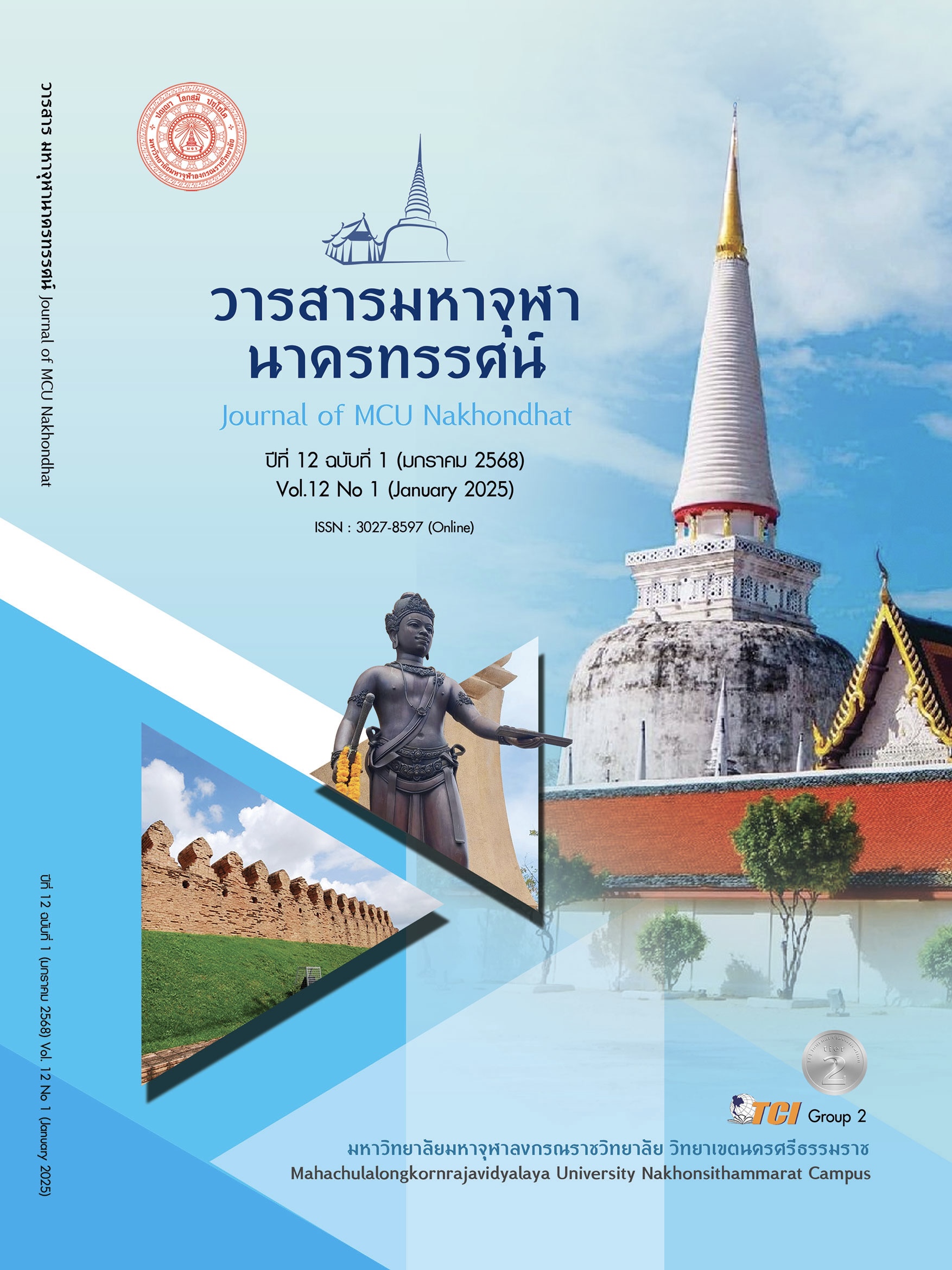THE RELATIONSHIP BETWEEN ETHICAL LEADERSHIP AND THE IMPLEMENTATION OF MORAL SCHOOLS UNDER THE OFFICE OF TRANG PRIMARY EDUCATIONAL SERVICE AREA 2
Main Article Content
Abstract
This research article aims to investigate 1) Ethical leadership, 2) The implementation of moral schools, and 3) The Relationship between ethical leadership and the implementation of moral schools under the Office of Trang Primary Educational Service Area 2. The study is quantitative in nature. The sample consists of 302 individuals, including government teachers, public employees, and contracted teachers engaged in teaching at educational institutions under the jurisdiction of the Office of Trang Primary Educational Service Area 2 during the 2024 academic year. The research instrument is a 5-point Likert scale questionnaire with a reliability coefficient of .974 for the ethical leadership scale and .976 for the moral school implementation scale. The statistical methods used for data analysis include percentage, mean, standard deviation, and Pearson’s correlation coefficient. The research findings indicate that ethical leadership, both overall and in specific aspects, is at the highest level. Similarly, the implementation of moral schools, both overall and in specific aspects, is also at the highest level. Furthermore, the relationship between ethical leadership and the implementation of moral schools, both overall and in specific aspects, is positively correlated at a high level (r = .746**) with statistical significance at the .01 level. Among the various aspects, the highest correlation is observed between fairness and the establishment of methods to achieve the school’s moral identity (r = .747**). This is followed by the correlation between fairness and the implementation of actions to achieve transformative goals, which shows a moderate positive correlation (r = .701**). The lowest correlation is found between trust and the development of core teachers and student leaders, which also demonstrates a moderate positive correlation
(r = .564**), respectively.
Article Details

This work is licensed under a Creative Commons Attribution-NonCommercial-NoDerivatives 4.0 International License.
References
กระทรวงศึกษาธิการ. (2545). พระราชบัญญัติการศึกษาแห่งชาติ พุทธศักราช 2542 (ฉบับที่ 2) และที่แก้ไขเพิ่มเติม พุทธศักราช 2545. กรุงเทพมหานคร: บริษัทสยามสปอรต์ ซินดิเคท จำกัด.
กันต์ฤทัย งานวิชา. (2566). การศึกษาสภาพการบริหารงานโรงเรียนคุณธรรมของศูนย์การศึกษาพิเศษ เขตการศึกษา 7 จังหวัดพิษณุโลก. วารสารการบริหารนิติบุคคลและนวัตกรรมท้องถิ่น, 9(8), 242-255.
ชูศรี วงศ์รัตนะ. (2553). เทคนิคการใช้สถิติเพื่อการวิจัย. นนทบุรี: ไทเนรมิตกิจ อินเตอร์ โปรเกรสซิฟ.
ณัฐริดา นิพนธ์. (2562). ความสัมพันธ์ระหว่างภาวะผู้นําเชิงจริยธรรมกับบทบาทของผู้บริหาร สถานศึกษาในการพัฒนาคุณลักษณะอันพึ่งประสงค์ของผู้เรียนในสถานศึกษา สังกัดสำนักงานเขตพื้นที่การศึกษาประถมศึกษานครสวรรค์ เขต 1. ใน วิทยานิพนธ์มหาบัณฑิต สาขาการบริหารการศึกษา. มหาวิทยาลัยสุโขทัยธรรมาธิราช.
นรา สมประสงค์. (2561). การบริหารองค์การในยุคสังคมโลกาภิวัตน์: คุณธรรมและจริยธรรมที่จำเป็น. วารสารสังคมศาสตร์, 8(1), 30-44.
บุญชม ศรีสะอาด. (2560). การวิจัยเบื้องต้น. (พิมพ์ครั้งที่ 10). กรุงเทพมหานคร: สุวีริยาสาส์น.
พงศ์สวัสดิ์ ราชจันทร์. (2565). บทบาทของภาวะผู้นำในการบริหารงานองค์การ. วารสารการบริหารจัดการ, 10(2), 50-65.
เพ็ญศิริ สมเรือน. (2560). ภาวะผู้นำเชิงจริยธรรมของผู้บริหารสถานศึกษา สังกัดสำนักงานเขตพื้นที่การศึกษาประถมศึกษาตราด. ใน วิทยานิพนธ์มหาบัณฑิต สาขาการบริหารการศึกษา. มหาวิทยาลัยบูรพา.
มูลนิธิยุวสถิรคุณ. (2560). คู่มือจัดกิจกรรมการพัฒนาโรงเรียนคุณธรรม. กรุงเทพมหานคร: สหมิตรพริ้นติ้งแอนด์พับลิสซิ่ง.
ศรีรักษ์ เรืองรัตน์. (2563). แนวทางการพัฒนาสถานศึกษาสู่มาตรฐานตามโครงการโรงเรียนคุณธรรม สพฐ. ของโรงเรียนสังกัดสำนักงานเขตพื้นที่การศึกษามัธยมศึกษา เขต 12. ใน วิทยานิพนธ์ครุศาสตรมหาบัณฑิต สาขาพุทธบริหารการศึกษา. มหาวิทยาลัยมหาจุฬาลงกรณราชวิทยาลัย.
สำนักงานเขตพื้นที่การศึกษาประถมศึกษาตรัง เขต 2. (2566). แผนปฏิบัติการประจำปีงบประมาณ (พ.ศ. 2566) (หน้าที่ 62). ตรัง: สำนักงานเขตพื้นที่การศึกษาประถมศึกษาตรัง เขต 2.
สำนักงานสภาพัฒนาการเศรษฐกิจและสังคมแห่งชาติ สำนักนายกรัฐมนตรี (ฉบับที่ 13). (2565). แผนพัฒนาเศรษฐกิจและสังคมแห่งชาติ (พ.ศ. 2566 - 2570). ราชกิจจานุเบกษา เล่ม 139 ตอนพิเศษ 258 ง (30 พฤศจิกายน 2565).
เสาวนีย์ ตรีพุทธรัตน์. (2561). ภาวะผู้นําเชิงจริยธรรม: กลยุทธ์การพัฒนาคุณภาพการศึกษาไทย. วารสารศึกษาศาสตร์ มหาวิทยาลัยนเรศวร, 20(4), 294-307.


